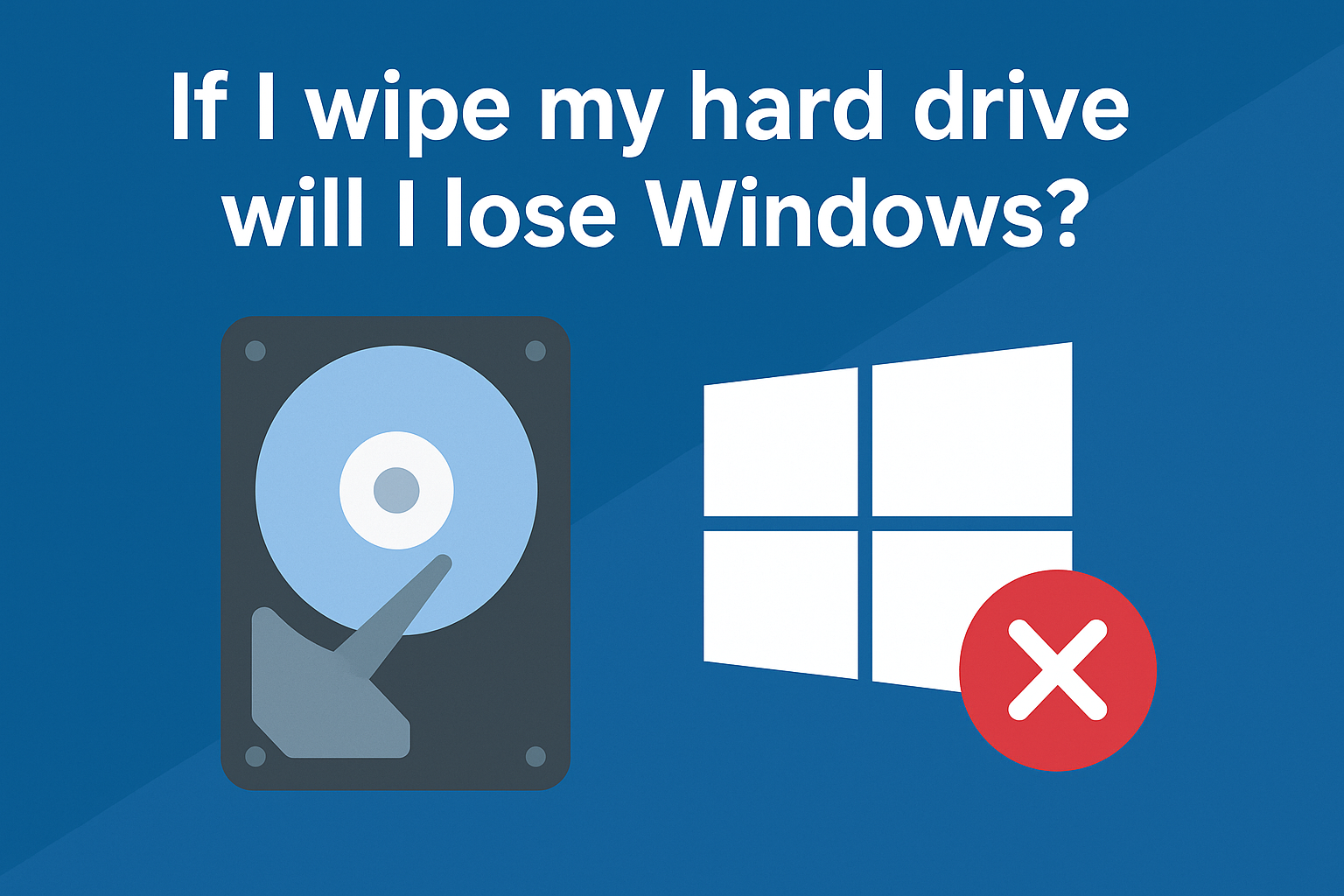If I Wipe My Hard Drive Will I Lose Windows? Here’s What You Need to Know

Many users ask the question: if I wipe my hard drive will I lose Windows? It’s a valid concern, especially when planning to erase data before selling a PC, eliminating malware, or performing a complete system overhaul. This article explores the implications of wiping a hard drive and provides step-by-step methods to do it safely—while also preserving or reinstalling Windows when necessary.
Understanding the Basics: What Happens When You Wipe Your Hard Drive?
Wiping a hard drive means you are removing all data from the hard drive, which is everything stored on a hard drive, including files, apps, configurations, and, yes, even the Windows operating system. Which brings us directly back to the question: if I wipe my hard drive, am I going to lose Windows? — Yes unless you have gone out of your way to backup or reinstall it
It will also wipe the OS if there is only one drive in the system (which is usually the case with laptops). Which is why you need to prepare accordingly based on whether you want to keep Windows or do a clean install later.
Method 1: Backup and Reinstall Windows
So what if you need to clear your drive but want to continue to run Windows on it:
Save your documents – Either with an external hard-drive or a cloud storage service.
Create a Windows Installation Media:
-
Go to the Microsoft Media Creation Tool and get a bootable Windows 10/11.
-
Plug in a USB (8GB minimum), run the tool, and follow instructions to create the installer.
Wipe the Drive:
-
Enter BIOS/UEFI (typically F2, F12, Del, or Esc on start)
-
Insert USB installation media and boot from it
-
It will ask you to erase partitions on your drive to clean all data,
Reinstall Windows:
-
Install Windows on the empty drive by following the steps on screen.
So the answer to "if I wipe my hard drive will I lose Windows" becomes: temporarily, but you can reinstall it right afterward using these instructions.
✅ Tip: Not going to wipe manually but do a full system wipe instead? How to Perform a Factory Reset of Your PC Correctly
Method 2: Use Secure Data Wipe Tools
If your goal is secure data deletion (for example, prior to resale) using more sophisticated wiping standards like the US DoD 5220.22-M will guarantee your data is wiped beyond recovery level.
SysTools Data Complete System Wipe Software has become one of the most trusted tools. The software understands overwriting methods which help to wipe it at deep level like DoD standard can be used to wipe safely drive of internal or external. However, do remember this method will not save Windows, so backup your OS or installation media before.
Alternatively, you can read the article: Full Guide to Wipe Hard Drives Completely — SysTools
Method 3: Wipe Only the Free Space
If you do not want to delete the whole drive but you want to remove all remnants of deleted files, you can wipe only the free space. Which means that this data will be written on the same space with no recovery options without harming your Windows installation.
See this guide on How to Wipe Free Space on Hard Drive for details and step-by-step.
Method 4: Remove Temporary and Corrupt Files
There's not always a need for a complete wipe. So, if you're trying to clean up your system or debug it:
How to delete Temporary Files for instant performance boost.
Follow this guide to Remove Corrupted Files responsible for the system errors.
Generally, these methods can help you to solve problems before performing a full OS restore.
Conclusion: What to Remember
The question we asked again was — Will I lose Windows if I wipe my hard drive? It does (unless you do something to back it up or to reinstall it). It is vital to know what your options are if you are decommissioning a machine, preparing it for sale, wiping corrupt data, or simply looking for a fresh start.
Reinstall Windows via bootable USB or use advanced tools such as SysTools Data Wipe Software for secure deletion. In case you are simply cleaning the system, wiping free space or even getting rid of unwanted temporary files can be adequate.
But, whatever your use case, make sure you use the right way to safeguard yourself from deleting important data—or your operating system—by accident.
- Art
- Causes
- Crafts
- Dance
- Drinks
- Film
- Fitness
- Food
- Games
- Gardening
- Health
- Home
- Literature
- Music
- Networking
- Other
- Party
- Religion
- Shopping
- Sports
- Theater
- Wellness


